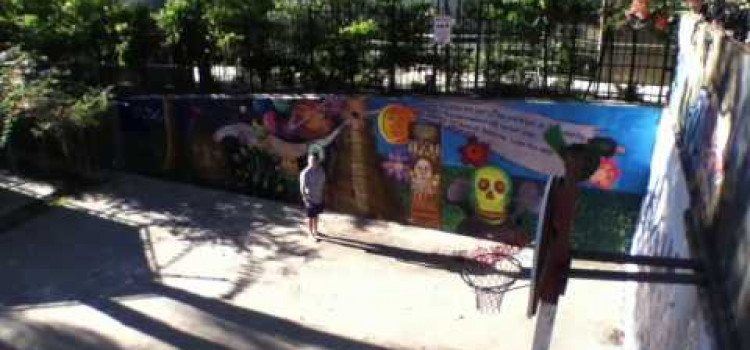

Young people are sitting in a circle at the beach, passing around Jarritos Mexican soda, joking about their secret crushes, and discussing where they would travel in the world if they could.
“Paris.”
“Greece.”
“Mexico.”
It may seem like a typical conversation, but for these youth, their dreams of traveling the world may never become reality. As undocumented immigrants, they are unable to leave the United States because if they do, they might not be able to get back in.
The gathering of about a dozen people is one of many “talking circles” that have sprung up over the past year in Long Beach, Calif., that are intended to provide a support network for a group of young people who are largely invisible to mainstream society: those who identify as both queer and undocumented, or “undocuqueer.”
“I really didn’t know anybody that was undocumented and gay until I met everyone here,” says 20-year-old Victor Perez, a student at Long Beach Community College who is originally from Mexico.
The undocuqueer live at the intersection of two communities that do not always accept one another, explains activist Miguel Montalva, who helped bring the circles to Long Beach: “It might be OK to be undocumented in an immigrant community, but it might not be OK to be queer in that community.”
As a result, Montalva says, “It pushes people to either hide their identity or only reveal certain parts.”
Immigrant and LGBTQ rights groups in Long Beach joined forces last summer when Montalva got an internship with the Long Beach Immigrant Rights Coalition, part of the UCLA Labor Center’s first Queer Dream Summer internship program for LGBTQ immigrant rights leaders. It was Montalva, a 29-year-old undocuqueer himself, who began bringing the two communities together.
“We saw such a beautiful, strong LGBT community in Long Beach but we really didn’t see an undocumented queer community visible,” says Montalva.
Long Beach has one of the biggest LGBTQ communities in Southern California and its gay pride celebration is the fourth largest in the nation (after San Francisco, New York, and West Hollywood), according to Porter Gilberg, administrative director of The Center, a community space where the circles are usually held.
Residents say the city also has a sizeable undocumented population. Nine percent of all residents in the neighboring city of Los Angeles are undocumented, according to a study by the University of Southern California. Dr. Norma Chinchilla, director of Long Beach Immigrant Rights Coalition, says the statistic more than likely applies to Long Beach as well.
Yet until the talking circles began earlier this year, there wasn’t a place where queer immigrants could go meet other people like them.
“[Long Beach] is very diverse in culture and ethnicities,” said 43-year-old Olivia Makepeace, one of the talking circle facilitators. “Not having a circle is kind of wrong.”
Makepeace has lived in the United States without papers for almost 30 years, and until now, struggled to find other people who were both queer and undocumented. When she was 15, her parents brought her from Mexico to the United States to provide her an education — something they couldn’t afford back home in Guadalajara, Mexico.
Now Makepeace provides young people like Perez the support that she wasn’t able to receive when she was first finding her way in this county.
For Perez, finding adequate support in Long Beach had been a problem for years.
“There’s so much information that I didn’t get until the undocuqueer [circles] came,” said Perez, who felt like he was the only undocumented Mexican student at Wilson High School.
Circle members helped Perez apply for in-state tuition under California’s AB 540 law. They also helped him apply for the federal Deferred Action for Childhood Arrivals (DACA) program, as well as scholarships. He received more than $1,500 for college, which got him through a whole year at Long Beach Community College.
Circle facilitators, often undocuqueer themselves, occasionally refer members to therapists and other professionals.
After the facilitator checks in with how everyone is doing, the group chooses a theme for discussion.
“It can be family, it can be relationships, it could be our own experience,” says Montalva. “For me [undocuqueer talking circles are] very important, because even in my own story as an undocumented queer person, there’s so much I never shared,” Montalva says.
Perez describes the circle as a “safe zone.”
“A lot of people share the same stuff you experience,” said Perez. “We vent and give advice.”
Impact on mental health
While research shows that LGBTQ youth suffer from mental distress due to social stigma and family rejection, these issues may be compounded for undocuqueers because of the constant hiding, coming out, and navigation of identities, says Montalva.
“If you can’t vocalize your identity to the groups you belong to, then that ultimately affects your psyche,” Montalva says.
Makepeace says she recognized that these pressures were taking a psychological toll on undocuqueer people that she could relate to.
“Some of the youngsters share their stories and you know, there’s pain, there’s suffering,” says Makepeace. “It’s a sort of psychological frustration.”
Although her family accepted her lesbian identity, Makepeace says she struggled with her status as an undocumented immigrant. In 1993, the California legislature passed SB 976, effectively revoking driver’s licenses from the state’s undocumented immigrants, including Makepeace.
Since then, she has lived without identification. “I could not open a bank account. I could not drive. I could not travel… That takes a toll on your identity and your mental health,” says Makepeace.
It wasn’t until last week – some 20 years later – that Gov. Jerry Brown signed into law a bill to grant driver’s licenses to some undocumented immigrants in the state.
Studies show that constant stress from living in fear of deportation can have lasting effects. According to the Urban Institute, children who live through the deportation of a parent often experience increased anxiety and nightmares, often continuing for months.
Undocumented immigrants also go without health insurance at a far higher rate than the general population, according to the Pew Research Center’s Hispanic Trends Project.
Connecting undocuqueers to a group where others have had similar experiences can be a first step toward overcoming some of these challenges.
“Mental health is key,” says Chinchilla of Long Beach Immigrant Rights Coalition. “We discovered that for marginalized groups, group mental health is what really works.”
Chinchilla is optimistic that the success of the healing circles will lead to them being replicated in other cities.
“Out of these circles will come activists,” she says, “people who find internal peace and wellbeing through helping to change things.”
Fighting for Undocuqueers
When Montalva first started his quest to find support for undocuqueers, not all of the activist organizations he worked with in Los Angeles and Long Beach were open to the intersection of LGBTQ and immigration issues. By coming out of the shadows, Montalva says, undocuqueers were seen by some immigration reform and LGBTQ advocates as diverting their movement.
But undocuqueer activists kept the pressure on. In recent years they have come out publicly, starting their own branches within advocacy organizations and positioning themselves as key players in the immigrant and LGBTQ rights movements.
Today, Montalva says, LGBTQ and immigrant advocacy organizations have come far in accepting their dynamic identities. This came about “through a lot of conversations,” he says, adding, “They weren’t pretty.”
About two years ago, the UCLA Labor Center started informal group discussions for undocumented people in Los Angeles. This early group consisted of activists and students from the University of California system, the California State University system, and community college campuses.
The first Los Angeles circles were intense, recalls Montalva.
“Everybody had so much to share they’d go on for more than two hours. There was so much emotion… you’re listening to other people’s stories which are also affecting you…It would be very taxing for people,” he says.
A more formal curriculum was later created, including tips on how to create a supportive space, establishing group rules and boundaries, and possible topics of discussion.
Based on his experiences in Los Angeles, Montalva decided to establish talking circles that would cater to Long Beach’s LGBTQ residents. Community members attending the circles now say there really isn’t anything else in the city like it.
Talking circles now exist throughout the greater Los Angeles area, including Pomona, La Puente, and Westwood. There are tentative plans for circles as far away as New York and Florida, and the curriculum is being circulated to immigrant youth groups around the country.
Montalva is soon moving to Boston to get a PhD in sociology at Northeastern University, and says he plans to start another circle there. “One of the biggest challenges,” he says, “is trying to find that community where you fit in. You can create your own community. That’s one of the great life lessons.”
This article was produced as part of New America Media’s LGBT immigration reporting fellowship sponsored by the Four Freedoms Fund.
If you are undocumented and LGBT, find a safe space to express yourself here in Long Beach: Talking circles are held on the second and fourth Thursday of every month at The Center, 2017 E. 4th St, from 6:30-8:30 pm.
http://lbirc.org/programs/undocuqueer-program/
Or contact the Center for more information:
2017 E. 4th Street, Long Beach, CA 90814 or call (562) 434-4455
